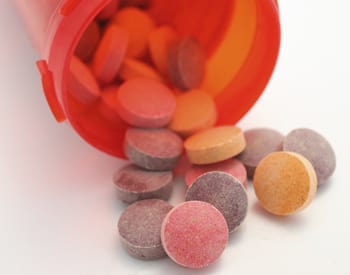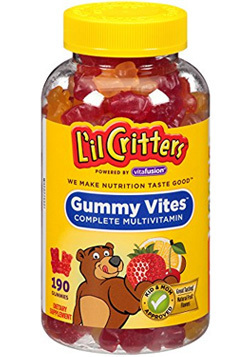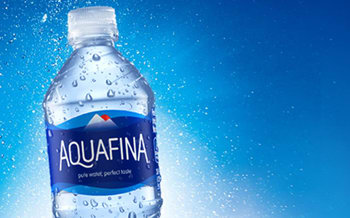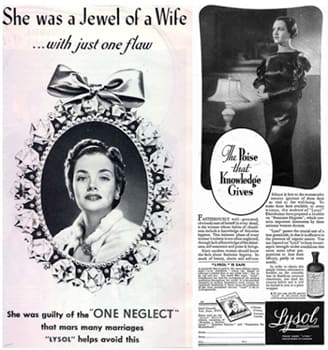I’m proud to say I don’t use any of these useless items (well, probably couldn’t drive a tank and er umm don’t have need for a douche) with the exception that I’ll buy bottled water if it’s convenient depending on where I’m at. At home, however it’s tap water if I’m thirsty, I refuse to pay for something that is being delivered to my home basically for free. I’ve always wanted to a blind taste test thing with some of these folks who only drink the ones in the snazzy bottle “because it’s the best” to see if they could tell the difference between that H2O and the store brand or even tap water for that matter. I guess the difference in price is only pennies, but those are useless too…
from Cracked
There are certain items that we keep around because of their perpetual usefulness. For instance, most of us probably have a flashlight (in case the power goes out), or a broom (in case you accidentally break something after the power goes out), or a hammer (in case you need to hammer something after the power goes out, or you are the one who has cut the power and need a blunt object to facilitate your home invasion). However, there are some items perpetually around your house or on the shelf at the grocery store that you probably can’t remember ever using. And while you might assume that their ubiquity means they are somehow indispensable, we assure you that no, they are not.
Here are six seemingly important products that have managed to stick around for decades despite the fact that we absolutely do not need them.
Pennies Won’t Die Because The Zinc Industry Won’t Let Them
 Catherine Lane/iStock
Catherine Lane/iStock
Speaking of spending money on useless junk — money is useless junk (and we don’t mean that in a philosophical sense). We’re all so busy booping our Apple pay and screaming at our chip cards that we never wonder whatever happened to cold, hard coins. Well, they’re still around; even the pennies. It’s just that nobody actually needs them anymore.
Chepko Danil/iStockEven the tooth fairy uses PayPal now.
There’s nothing you can buy with a penny — not even, as retirethepenny.org points out, a penny (it costs 1.7 cents to make one). Try handing over a hundred or more pennies in a single transaction, and you’ll receive a thousand death stares and a lifetime ban along with your goods. There simply isn’t a use for this coinage anymore. Unless, of course, you are Big Zinc. The zinc lobby does exactly that: They lobby(hard and successfully) to ensure that pennies continue to be created using zinc rather than steel. They fight for the penny’s right to exist, claiming inflation would spiral out of control if we no longer had access to these useless, wallet-destroying coins … even though countries like Canada and Australia have already done this, and they seem to be fine.
Zinc doesn’t stand alone in their defense of the penny. Coinstar has also thrown its weight behind the coppers, bankrolling polls aimed at “proving” that Americans would prefer to keep the coins around. And so we continue spending millions pumping them out year after year — although it’s been rumored that the penny’s production will finally be halted in 2017. So prepare for the apocalypse, everyone!
Multivitamins Have No Business Being A Thing
 Valentina_G/iStock
Valentina_G/iStock
For the past 24 years, studies have consistently shown that multivitamins don’t do a goddamn thing. Megavitamins, despite their epic name, increase the risk of ill health, sometimes being linked to cancer and heart disease. This information is out there for anyone to see, but medical journals are super boringand vitamins have cartoon characters and bright colors, and frankly, we’re all about that shit.

You know who does read those journals? The National Products Association and the Council For Responsible Nutrition. We know half of you fell asleep halfway through that sentence, but this matters, because those are two hardcore lobbying groups that fight for the existence of these pointless and occasionally harmful products. They do this by challenging any and all studies that might undermine their product. They’ll point our (or fabricate) flaws in a study or its participants, and if that doesn’t work, they’ll accuse the researchers of being in bed with Big Pharma — whatever it takes to discredit the results.

Not that they really need to worry about these results, since the government has essentially zero control over what gets billed as a “health supplement.” Since 1994, the multivitamin industry has been given virtually limitless free reign over their health products. The government is not allowed to question the veracity of their health claims. They are forbidden from holding the supplements up to the same standards given to other forms of drugs and medications. As a result, anyone can throw together a bunch of random ingredients and call it a health supplement, and there’s not a goddamn thing we can do about it.
Bottled Water Companies Created Their Own Monopoly By Pretending Tap Water Was Bad
 Lew Robertson/iStock
Lew Robertson/iStock
For years, bottled water companies convinced us they were harvesting streams of crystal clear, impeccably clean water to bring the ultimate in taste and purity directly to our refrigerators. As it turned out, those streams were totally fictional. Most of the water consumers paid good money for came not from some mythical melting glacier, but directly out of the local water source. In other words, millions of people were spending millions of dollars on plain old tap water — the very same thing the bottled water industry tried to tell us was undrinkable piss.

The first step was to wage war on tap water being served in restaurants (who were happy to comply, seizing on an opportunity to increase their revenue). Olive Garden and Coca-Cola even held a “who can fool the most customers into paying for overpriced sink water” contest, and it worked. Word eventually got ’round of the contest’s success, holding it up as an example and goal for other restaurants and beverage companies to follow. Which, of course, they did.
You might wonder why any rational human being would pay money for something they had ready access to for free, and the answer is simple: A wide variety of beverage companies offering bottled water provided the illusion of choice. That way, you don’t feel like you’re being an idiot for buying water — you’re being smart for buying the least expensive one.
For those that didn’t fall for that trap, there was the insistence that bottled water is cleaner and safer than tap water (which, again, is what most bottled water is). People eventually became so caught up in the fictional health risks of tap water that businesses and sports venues began removing water fountains (or allowing them to fall into disrepair) while they quietly made the switch to pricey bottled water. This decision has backfired on many. National parks, for instance, have noticed an increase in littering since bottled water forced itself onto the trails. When they tried to reinstall drinking fountains and cut back on bottled beverages, the companies lobbied against them, insisting that these restrictions were forcing customers to drink unhealthy sports drinks instead. If only there was some third option.
The Yellow Pages Industry Only Exists Because Everyone Is Too Lazy To Opt Out
 robynmac/iStock
robynmac/iStock
You might be wondering, “Who even uses the Yellow Pages anymore?” Well, nobody. However, whereas the previous industries we’ve discussed have all moved proverbial mountains to keep their pointless products on store shelves, the Yellow Pages don’t have to. No, the only reason the Yellow Pages still exist is because you’re a lazy asshole.
Most businesses have moved their contact information online, because it’s infinitely easier to type in the name of a business and have its information materialize before your very eyes than it is to dig through a dirty book with barely legible print while frantically searching for an emergency plumber on a Tuesday afternoon. So why do these oversized catalogs continue to show up on our doorsteps? Well, for a long time, there wasn’t any way to opt out of them. Eventually recognizing this for the waste of resources that it is, cities ensured that opting out was both possible and easy, and phone book companies were held liable for unwanted books that were delivered. But this didn’t last. Those companies sued, claiming these laws infringed on their right to free (if entirely pointless) speech, and won.
Now, the opt-out option technically still exists, but only to prevent the necessity of an opt-in system, which would absolutely spell the death of the industry. Most phone book companies don’t advertise your ability to stop receiving the books, and some will continue delivering them free of penalty. So the greedy phone book companies are to blame for all this waste, right? Not completely. Even when these companies provide clear and easy means of cancelling phone book subscriptions, the majority of people go for the even easier “throw the books straight into the trash” option. Not only is our laziness keeping a failing business alive, but we’re destroying the environment with our indifference. Good job, us.
The Army Only Buys Tanks Because People Would Lose Jobs Otherwise
 GBlakeley/iStock
GBlakeley/iStock
Times have changed, and with them, the art of warfare. We no longer trudge our soldiers over vast swaths of land in cramped, stinking tanks — that privilege is reserved for A-list actors. Now the military has speedy jets and remote-controlled missiles — high-tech tech tools which increase the speed and convenience of war. Yet the U.S. military continues to purchase tanks to the tune of $120 million per year, and they don’t even want them.
The Army has been attempting for years to put the kibosh on tank spending, to no avail. Every year, they propose a reduced budget which would eliminate the majority of these purchases, and every year, they lose to an unyielding Congress that chooses to pull rank on them. They’re not just being dicks, though; Congress does have the livelihood of technical workers in Ohio in mind, stating that the continued purchase of these tanks provides these workers with jobs. In the end, we kinda have to hand it to them: Congress is singlehandedly keeping the unemployment rate down by mass-producing thousands of heavy-duty military weapons for absolutely nobody. The only drawback is that the Army has thousands of tanks sitting around unused.
Besides keeping hardworking tank builders employed, Congress also insists that the tank is crucial to national security, so we keep building more and more of them. This is sort of like keeping a room in your house regularly stocked with thousands of handguns in case someone breaks in, and also because the guy who owns the gun store is a real nice dude.
The Douching Industry Tricked Women Into Thinking They’re Dirty
 ShotShare/iStock
ShotShare/iStock
The vagina, like your modern oven or a dog’s mouth, is self-cleaning. In fact, dyes, perfume, soaps, and other foreign substances can throw everything out of whack, resulting in infections or irritation. This is fairly common knowledge now, but by the ’90s, the feminine hygiene industry had convinced millions of women that their nether regions were so icky that they had to cleanse them on a daily basis by douching. How did they achieve this feat? Through the magic of deceitful advertising, of course.
The majority of douching products were mixtures of water and a natural cleaning agent like baking soda or vinegar (ouch), but others were nothing but water and the aforementioned hooha-destroying fragrances. In fact, frequent use of these products was believed to increase risk of ectopic pregnancy (a life-threatening situation wherein a fertilized egg remains in the Fallopian tube instead of moving into the uterus) and pelvic infections. And yet for decades, advertising campaigns would liken the experience of douching to a cool summer breeze or babbling brook or some such nonsense, creating a persistent association between the product and cleanliness. In a world where merely owning a vagina can be grounds for persecution, women undoubtedly felt having an offensively smelly one would only make matters worse. Thus was an insanely successful yet utterly useless industry born.
But even before there was Massingill, there was Lysol. See, the urge to keep our privates pristine may be a fairly recent development, but women have been basting their genitals with toxic chemicals for almost a century. During the Great Depression, birth control was illegal, which is the exact opposite of “but-we-can-barely-feed-ourselves” logic. Douching was sold as a way to improve the smell of a woman’s vaginal area, but historians believe that was a clever code for, “This shit will make damn sure nothing comes out of here that you don’t want getting out.” In other words, Lysol was used as a surreptitious form of birth control. Women were so desperate to take their bodies back into their own hands that they’d risk burning, death, and these equally horrifying ads:
 LysolAt least there’s no feathered hair in this one.
LysolAt least there’s no feathered hair in this one.
Despite our knowledge of the dangers of douching, many women in Mexico are reviving the perilous routine, proving old habits and years of brainwashing marketing campaigns die hard.